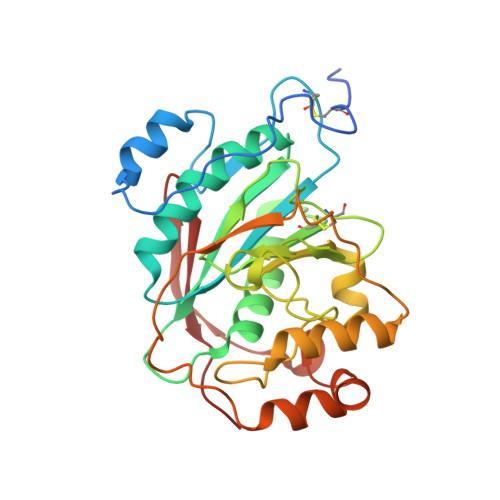Deoxygenated Disaccharide Analogs as Specific Inhibitors of {beta}1-4-Galactosyltransferase 1 and Selectin-mediated Tumor Metastasis
Brown, J.R., Yang, F., Sinha, A., Ramakrishnan, B., Tor, Y., Qasba, P.K., Esko, J.D.(2009) J Biol Chem 284: 4952-4959
- PubMed: 19106107
- DOI: https://doi.org/10.1074/jbc.M805782200
- Primary Citation of Related Structures:
3EE5 - PubMed Abstract:
The disaccharide peracetylated GlcNAcbeta1-3Galbeta-O-naphthalenemethanol (disaccharide 1) diminishes the formation of the glycan sialyl Lewis X (Neu5Acalpha2-3Galbeta1-4(Fucalpha1-3) GlcNAc; sLe(X)) in tumor cells. Previous studies showed that the mechanism of action of disaccharide 1 involves three steps: (i) deacetylation by carboxyesterases, (ii) action as a biosynthetic intermediate for downstream enzymes involved in sLe(X) assembly, and (iii) generation of several glycans related to sLe(X). In this report, we show that GlcNAcbeta1-3Galbeta-O-naphthalenemethanol binds to the acceptor site of human beta1-4-galactosyltransferase much like the acceptor trisaccharide, GlcNAcbeta1-2Manbeta1-6Man, which is present on N-linked glycans. The 4'-deoxy analog, in which the acceptor hydroxyl group was replaced by -H, did not act as a substrate but instead acted as a competitive inhibitor of the enzyme. The acetylated form of this compound inhibited sLe(X) formation in U937 monocytic leukemia cells, suggesting that it had inhibitory activity in vivo as well. A series of synthetic acetylated analogs of 1 containing -H, -F, -N(3), -NH(2), or -OCH(3) instead of the hydroxyl groups at C-3'- and C-4'-positions of the terminal N-acetylglucosamine residue also blocked sLe(X) formation in cells. The reduction of sLe(X) by the 4'-deoxy analog also diminished experimental tumor metastasis by Lewis lung carcinoma in vivo. These data suggest that nonsubstrate disaccharides have therapeutic potential through their ability to bind to glycosyltransferases in vivo and to alter glycan-dependent pathologic processes.
Organizational Affiliation:
Department of Cellular and Molecular Medicine, Glycobiology Research and Training Center, University of California, San Diego, La Jolla, California 92093, USA.






















